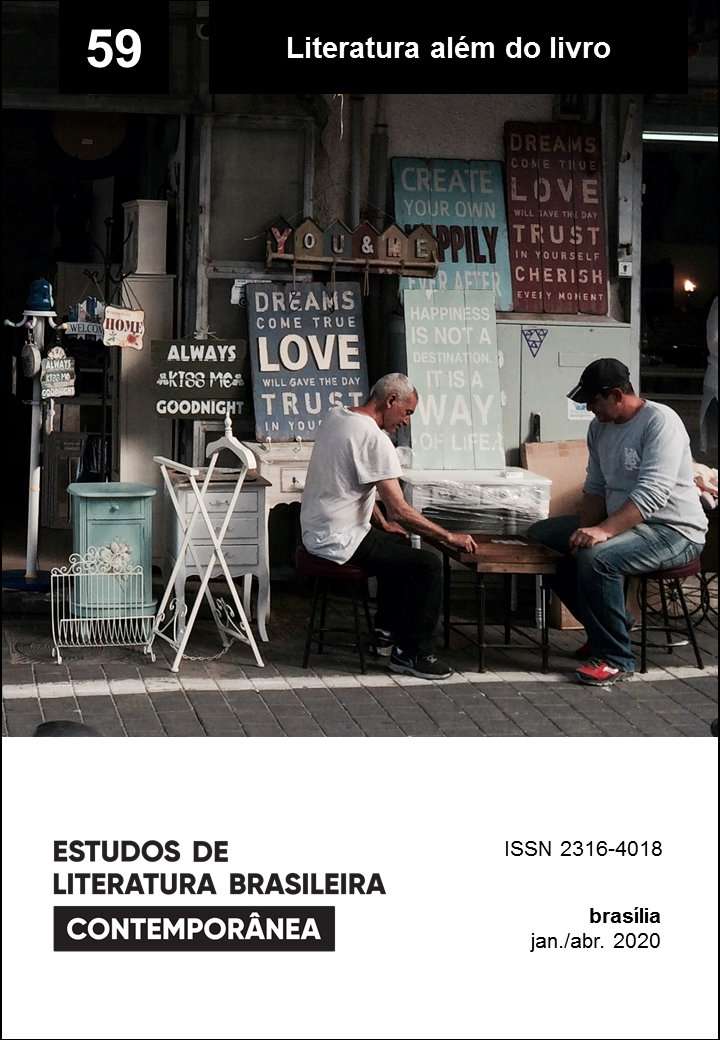Between Exu and Ogum: politics of the sacred in the drama by Abdias do Nascimento
DOI:
https://doi.org/10.1590/2316-4018597Keywords:
drama, Orixas mythology, Abdias do NascimentoAbstract
Critical study of mythic determinants in the construction of characters and composition of action in Sortilégio II (“Sortilege II”), drama by Abdias do Nascimento. The theater by Abdias obeys to paradigms of scene composition that go beyond the sintagmatic organicity of fable, but, in presenting the complexes and passions of Emanuel, it searches a discontinuous and paradigmatic organization in order to deal with the life of a unique and dominant subjectivity in scene. In Sortilégio II, this post-catastrophe theater configuration is ideal to weave the Emanuel’s rememorative processes in the attempt to project the character traumatic past onto the present scene, marked by social violence, racial complexes and contradictory erotic relations with Ifigênia and Margarida. In the play, besides the structural definitions of action, the Afro-Brazilian sacred and the Orishas mythology are important cultural modulations that interfere in the relations of power among agents and in the processes of subjectivation that affect Emanuel. A social and symbolic network, under the tutelage of Eshu and Ogoun, contributes to the liberation and deification of the character. Through the recognition of black culture, of ethno-racial belonging, and mythical sacrifice, Emanuel leaves the human racist world to inhabit Orún, the divine plan of the Orishas.
References
BASTIDE, Roger (2001). O Candomblé da Bahia: rito nagô. Tradução de Maria Isaura Pereira de Queiroz. São Paulo: Companhia das Letras.
BORNHEIM, Gerd (1992). O expressionismo. In: BORNHEIM, Gerd. Brecht: a estética do teatro. Rio de Janeiro: Graal. p. 23-41.
CABRERA, Lydia (2004). Iemanjá e Oxum: iniciações, ialorixás e olorixás. Tradução de Carlos Eugênio Marcondes de Moura. São Paulo: Edusp.
DANTAS, Beatriz Góis (1988). Vovô nagô e papai branco: usos e abusos da África no Brasil. Rio de Janeiro: Graal.
LUNA, Sandra (2008). A tragédia no teatro do tempo: das origens clássicas ao drama moderno. João Pessoa: Ideia.
LUZ, Marco Aurélio (2000). Agadá: dinâmica da civilização africano-brasileira. Salvador: Edufba.
MARTINS, Leda Maria (1995). A cena em sombras. São Paulo: Perspectiva.
NASCIMENTO, Abdias do (1961). Dramas para negros e prólogo para brancos. Rio de Janeiro: Teatro Experimental do Negro.
NASCIMENTO, Abdias do (1978). O genocídio do negro brasileiro: processo de um racismo mascarado. Rio de Janeiro: Paz e Terra.
NASCIMENTO, Abdias do (1979). Sortilégio II: mistério negro de Zumbi redivivo. Rio de Janeiro: Paz e Terra.
NASCIMENTO, Abdias do (2004). Teatro Experimental do Negro: trajetória e reflexões. Estudos Avançados, São Paulo, v. 18, n. 50, p. 209-224, jan./abr.
PRANDI, Reginaldo (1996). Herdeiras do axé: sociologia das religiões afro-brasileiras. São Paulo: Hucitec.
PRANDI, Reginaldo (2001). Mitologia dos Orixás. São Paulo: Companhia das Letras.
PRANDI, Reginaldo (2005). Segredos guardados: Orixás na alma brasileira. São Paulo: Companhia das Letras.
RISÉRIO, Antonio (1996). Oriki Orixá. São Paulo: Perspectiva.
RODRIGUES, Nelson (2010). Vestido de noiva. 3. ed. Rio de Janeiro: Nova Fronteira.
SARRAZAC, Jean-Pierre (2011). O outro diálogo: elementos para uma poética do drama moderno e contemporâneo. Tradução de Luís Varela. Évora: Licorne.
SARRAZAC, Jean-Pierre (2013). Sobre a fábula e o desvio. Tradução de Fátima Saad. Rio de Janeiro: 7 Letras: Teatro do Pequeno Gesto.
SIQUEIRA, José Jorge (2006). Entre Orfeu e Xangô. Rio de Janeiro: Pallas.
Downloads
Published
Issue
Section
License
Authors who publish in this journal agree to the following terms:
a) The authors maintain the copyright and grant the journal the right of first publication, the work being simultaneously licensed under the Creative Commons Attribution License-Non Commercial 4.0 which allows the sharing of the work with acknowledgment of the authorship of the work and publication this journal.
b) Authors are authorized to enter into additional contracts separately, for non-exclusive distribution of the version of the work published in this journal (eg publish in institutional repository or as a book chapter), with authorship recognition and publication in this journal.
c) Authors are allowed and encouraged to publish and distribute their work online (eg in institutional repositories or on their personal page) after the editorial process, as this can generate productive changes, as well as increase the impact and citation of published work (See The Effect of Free Access).
d) The authors of the approved works authorize the magazine to, after publication, transfer its content for reproduction in content crawlers, virtual libraries and the like.
e) The authors assume that the texts submitted to the publication are of their original creation, being fully responsible for their content in the event of possible opposition by third parties.


